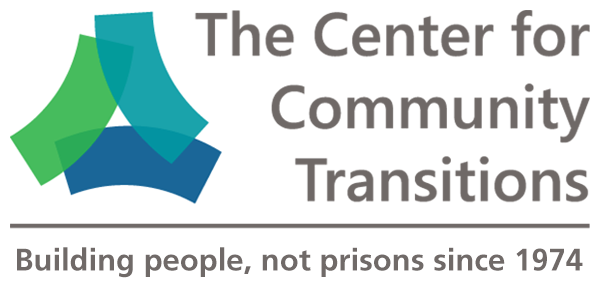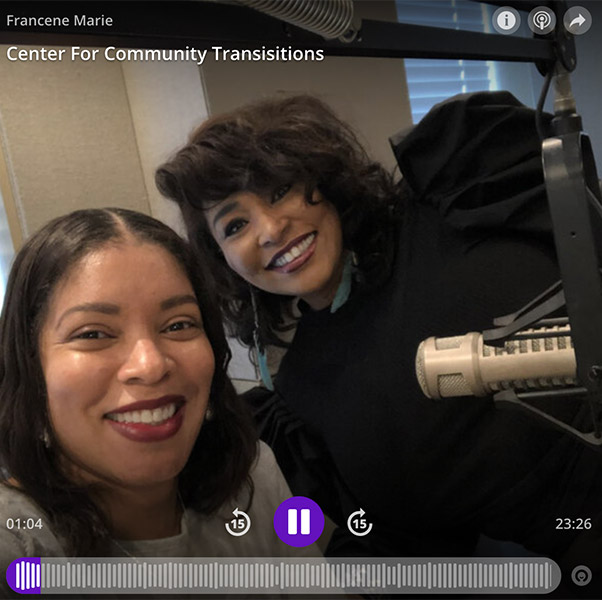History of CCT
For more than four decades, the Center for Community Transitions (CCT) has assisted individuals and families throughout the Charlotte-Mecklenburg community who have been impacted by incarceration, while also serving as a thought leader on re-imagining justice.
In the early 1970s, a North Carolina Department of Correction intern presented a white paper on reducing recidivism by helping people find employment and housing when released from prison. Research at that time - and still today - cites employment as a way to reduce recidivism. From that document, NCDOC applied for an AmeriCorps VISTA (Volunteers in Service to America) grant to help inmates transition from prison to the Charlotte community.
CCT has grown from serving 100 people annually to serving 1,500-plus while operating with 23 full-time employees and a $1.7 million annual budget. The timeline below charts CCT’s history, highlights, notable news and milestones.
1970s
1974
Ex-Convicts Organization (pronounced ‘echo’) becomes a 501c(3) organization to “fill the needs of ex-cons and to keep them ex-cons.” ECO begins its operations in the basement of First Presbyterian Church in Charlotte on a $700 annual budget. Brochure copy reads: We use prisons in two ways: to protect ourselves from dangerous individuals but mostly to punish people for their bad deeds. But in trying to punish them, we often punish ourselves more. 83% of all prisoners are convicted for nonviolent crimes. These people are then incarcerated with violent criminals; they learn dangerous skills in prison, they become alienated, they lose touch with our changing world.
1978
Ex-Convicts Organization changes its name to Energy Committed to Offenders. Its mission is to improve the quality of life in Charlotte-Mecklenburg by restoring offenders to their families and the community, helping them find work and reducing recidivism. ECO works with offenders during their incarceration in county and state facilities by offering presentations on post-release employment. ECO also assists recently released offenders by providing transportation for job searches, new jobs, housing and clothing referrals and helping them obtain copies of their social security cards and birth certificates.
1979
North Carolina has 261 inmates per 100,000 population - the highest in the nation.
1980s
1986
In response to the closing of five residential facilities for women, the North Carolina Legislature passes a bill to allow ECO to provide housing for women nearing the end of their release from prison.
October 1987
The 20-bed ECO Center for Women opens as the state’s first contract work release prison program for women completing their state prison sentences and within 3 years of parole. It helps women successfully transition from prison to their family and community while upholding standards of the North Carolina Department of Corrections.
January 1988
Gordon Poole joins ECO as Executive Director, while Myra Clark joins as Center for Women program director. The organization operates on a $400,000 annual budget with 7 staff members.
1990s
1994
The Homeless Services Network of Charlotte-Mecklenburg forms to serve Charlotte's homeless community and those who are most vulnerable to homelessness.
1996
ECO opens Deborah’s House, a program for women being released from prison who have no housing available. The program houses up to 10 women and operates as a “halfway house” for those released. The program closes 4 years later.
January 1998
Myra Clark becomes Executive Director, following Gordon Poole’s retirement.
1999
CCT begins offering support groups for families affected by incarceration.
2000-2010
2000
CCT joins the North Carolina Second Chance Alliance.
Myra Clark becomes president of the Homeless Services Network of Charlotte-Mecklenburg.
January 2004
President George W. Bush refers to America as “the land of second chances” during his State of the Union Address, a turning point in the national conversation around prisoner reentry and recidivism.
2005
Clients select Families Doing Time (FDT) as the name for the new CCT program offering school-based support groups for children of incarcerated parents and monthly family meetings. The program also provides community support and helps families prepare for reunification.
2006
CCT’s Aftercare becomes LifeWorks!, an individual and classroom program to help prepare formerly incarcerated individuals for employment.
2007
The Board of Directors approves changing the organization’s name from ECO, Inc. to The Center for Community Transitions, Inc. to better reflect its mission and goals.
CCT receives accreditation from the Better Business Bureau for 20 Standards for Charitable Accountability.
The Mecklenburg Opportunities for Reentry Network (MORN) forms. Myra Clark helps found the coalition of agencies and organizations working to address the needs of offenders and those at risk of criminal involvement. Its goals are: 1) improve collaboration and coordination of procedures, processes and services for those involved in the criminal justice system; 2) identify and eliminate gaps and barriers and advocate for services and programs to increase the opportunity for successful reentry; 3) advocate for services, programs and public policies to increase the opportunity for successful reentry; and 4) increase public knowledge about criminal justice dynamics, including reframing reentry as a public safety issue.
2008
CCT is listed in GuideStar, the world's largest source of information on nonprofit organizations.
September 2008
The Charlotte Observer runs an article on “Seeking a chance to show their worth” highlighting CCT and its Employment Readiness Workshop.
June 2009
The U.S. Conference of Mayors publishes a 79-city survey and best practice report on the status of ex-offender reentry efforts. MORN is highlighted for its best practices in addressing issues the 1,000-plus offenders each year face when returning to the Charlotte-Mecklenburg area from prison. The network is noted for resources that include housing, employment, job skills development, education, substance abuse treatment, mentoring and family support.
2010
Elevation Church hosts its first LOVE Week, where members go out and serve in the community. Each year, the church sends a group of volunteers to CCT to give their time and energy.
The Center for Women moves to a newly built 30-bed facility to help residents successfully transition from prison to their family and community.
Myra Clark addresses the Mecklenburg County Commissioners on behalf of Reentry Partners of Mecklenburg (formerly Mecklenburg Opportunities for Reentry Network) on reentry issues and community efforts.
August 2010
Families Doing Time hosts its first Back in Style event. The annual fundraiser helps kids with incarcerated loved ones prepare for the new school year with free book bags, school supplies and haircuts.
2011-2015
2011
Center for Women begins using Skype to allow residents to virtually visit with family members who are out-of-state or unable to travel.
2012
CCT is an alumnus for SEED20, a program that identifies, highlights and connects the community to innovative ideas for tackling pressing social challenges.
January 2012
NC Department of Correction consolidates with the Department of Crime Control and Public Safety and the Department of Juvenile Justice and Delinquency Prevention to form the North Carolina Department of Public Safety.
April 2012
CCT hosts its first Spring Fling event to honor volunteers and supporters.
May 2013
Myra Clark receives the Liberty Bell Award from the Mecklenburg County Bar. The prestigious award is for non-attorneys who contribute to the criminal justice system through community service work.
2015
CCT forms a strategic partnership with Goodwill Industries of Southern Piedmont and other partners at the Goodwill Opportunity Campus.
September 2015
Myra Clark is a guest on WFAE’s Charlotte Talks with Mike Collins to discuss “Transitioning To Life After Prison.”
2016-2017
2016
LifeWorks! moves to the Goodwill Opportunity Campus, where clients receive reentry, health care, financial literacy and career development services.
March
CCT is featured in a NC Child: The Voice for North Carolina’s Children article, “Supporting the Families of Incarcerated Parents.”
April
Myra Clark is a guest on WFAE’s Charlotte Talks with Mike Collins to discuss “New Federal Guidelines On Housing Policy And Criminal Records.”
2017
Playing for Others hosts its annual “Connecting Charlotte” event, where teens share spoken word pieces for nonprofit honorees, including CCT.
March
CCT hosts a Second Chance Alliance Listening Session for people who have been impacted by probation and incarceration. Presenters share information and resources to alleviate the consequences of having a criminal record, while participants have a safe listening space to share stories and learn advocacy tools.
CCT hosts an experiential workshop for church groups to help them understand the mental, social, financial and emotional challenges of incarceration and reentry - from the perspective of adults and children.
April
Fox 46 Charlotte’s Good Day features CCT in the segment, “Do Good Week with The Center for Community Transitions.”
July
Myra Clark is a guest on WFAE’s Charlotte Talks with Mike Collins to discuss “Ex-Offenders and Challenges on Transitioning Back to Society.”
November
CCT heads to Raleigh to meet with legislators and march and rally for National Day of Reentry Nonprofits and Charlotte’s Reentry Day. Reentry Partners of Mecklenburg and the NC Second Chance Alliance organize the efforts.
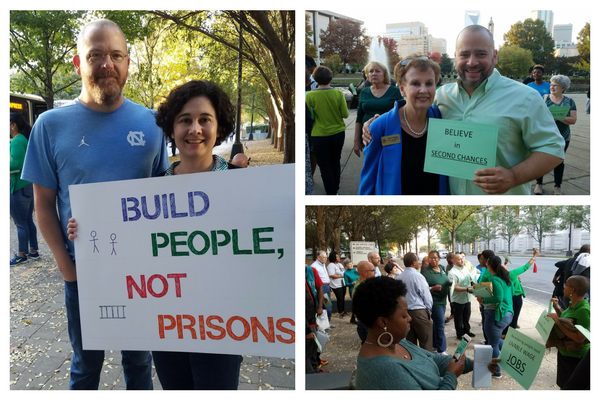
Patrice Funderburg, founder of a social justice advisory services company and Changed Choices mentor, joins CCT’s Board of Directors.
2018-2020
2018
CCT receives a $70,000 grant from the Women’s Impact Fund to support Families Doing Time.
January
CCT is featured in The Junior League of Charlotte’s blog, “Community Partner Spotlight.”
February
Myra Clark appears in WSOC-TV’s segment on reentry, “The formerly incarcerated look for second chances.”
The Charlotte Observer features CCT in the article, “How a 27-year-old with a criminal record rebrands himself right out of prison.”
Myra Clark participates in a city-wide panel on mass incarceration, along with keynote speaker Dominique DuBois Gilliard, author of “Rethinking Incarceration: Advocating for Justice That Restores.” CCT is included in the Creative Loafing article “Charlotteans Come Together to Fight Mass Incarceration.”
May
CCT is featured in the Charlotte Magazine article, “How Can a Growing City Help the Unemployed?”
July
Myra Clark is a guest on WFAE’s Charlotte Talks with Mike Collins to discuss “The Challenge of Transitioning Back Into Society Post Incarceration.”
September
CCT begins a partnership with the North Carolina Formerly Incarcerated Transition (FIT) Program and Charlotte Community Health Clinic to provide treatment and resources that help ensure formerly incarcerated individuals successfully transition.
The Center for Women has served more than 2,000 women when the facility celebrates its 30th anniversary.
October
Former CCT client Deborah Rose is a featured Goodwill “Success Story.”
2019
January
CCT hosts its first-ever Second Chance Employer Breakfast for employers who hire people with records and employers who want to learn about the benefits of second chance hiring.
March
Carolina Panthers’ Torrey Smith pays a surprise visit to the Center for Women. He speaks to residents about his experience being the child of an incarcerated parent and offers words of encouragement to the women whose children have a hard time with their incarceration.
Myra Clark visits The Francene Marie Show to discuss incarceration costs, community awareness and criminal justice.
April
Retired Carolina Panther Julius Peppers presents a $10,000 check to CCT for its “amazing work in the community.” As someone whose family has been impacted by incarceration, Peppers says he’s excited to partner with CCT in its efforts to support families with an incarcerated loved one incarcerated and help get them re-acclimate upon their release.
May
Families Doing Time kids visit Fahrenheit-Charlotte, where they learn about culinary arts, meet Carolina Panthers Jonathan Stewart, make and eat pasta and take a behind-the-scenes tour.
WFAE includes CCT in its year-long series on Charlotte’s affordable housing problem: Finding Home: Ex-Offenders Still Face Challenges Finding Housing Despite Change In HUD Policy.
June
CCT talks to media panelists about its clients and second chance employers at a PRSA Charlotte luncheon.
Fall
CCT attends the “Untapped Potential: The Hidden Workforce” event to discuss “rethinking and reimagining talent strategies to successfully tap into” an often-overlooked talent pool: formerly incarcerated individuals.”
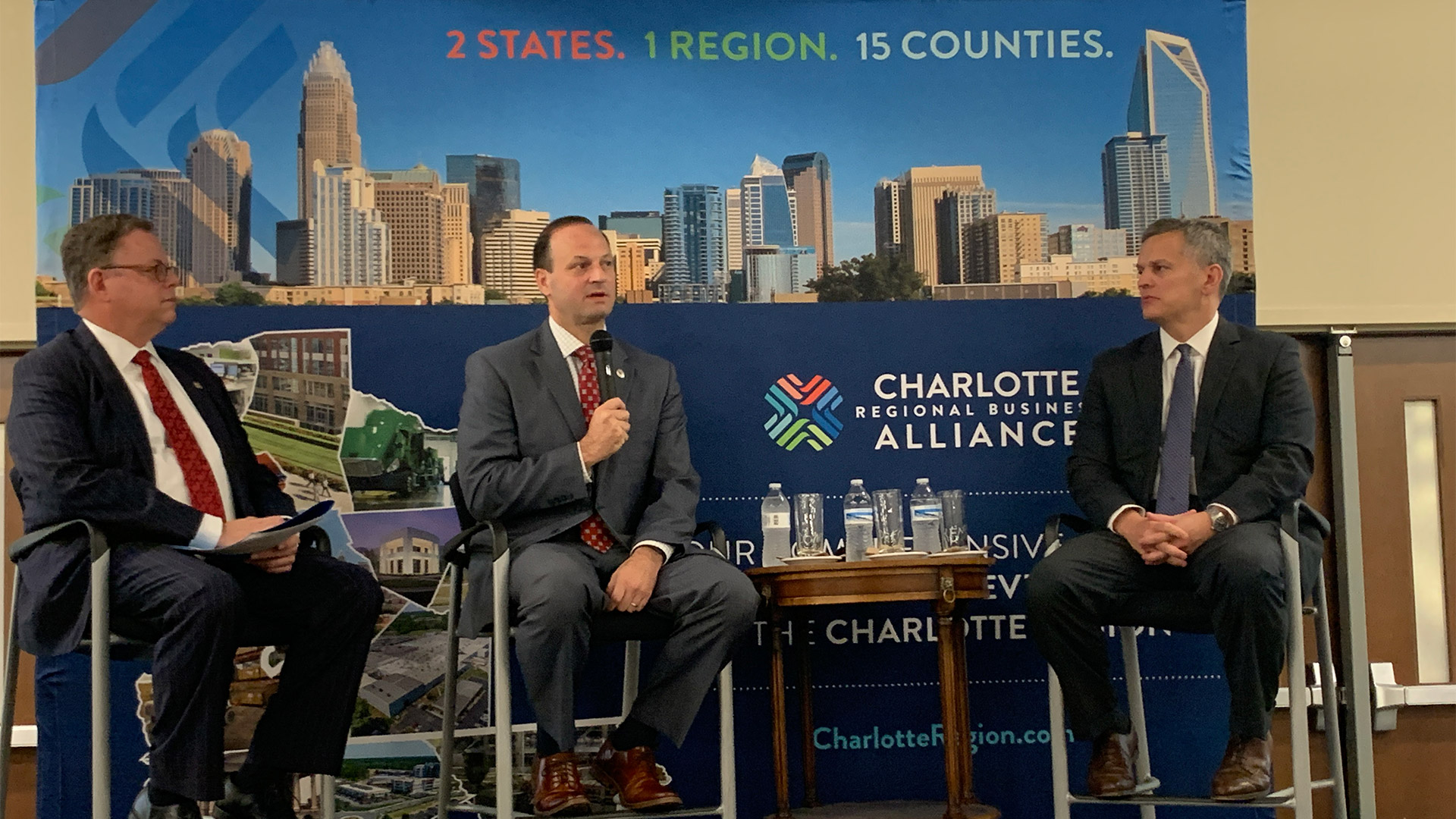
Through a partnership with the Wells Fargo Center for Community Engagement at Queens University of Charlotte, students experience firsthand how incarceration affects mental health and how CCT works with the prison system to offer services to formerly incarcerated individuals. The “Queens in Focus” inaugural newsletter highlights the partnership.
The university screens “Life After Life,” a documentary that’s part of the Criminal Justice Education Series: Mass Incarceration and Life After Reentry. LifeWorks! participates in a post-film panel discussion.
CCT also attends “A Conversation with Michelle Alexander” event on ending racial caste in America and insight on the challenges facing the civil rights community. Alexander is the author The New Jim Crow: Mass Incarceration in the Age of Colorblindness.
Myra Clark participates in “Second Chances, a Social Justice Imperative: Increasing Opportunities for those Returning from Incarceration,” a moderated panel highlighting nonprofit service providers working in the second chance and social justice space. The event is part of Bank of America’s Neighborhood Builders Leadership Program to help nonprofit leaders address economic mobility and social progress issues.
2020
January
Myra Clark announces her retirement from CCT after 32 years. Patrice Funderburg becomes the new executive director.
Myra Clark visits The Francene Marie Show to discuss community reentry after incarceration.
February
A Center for Women resident watches her daughter’s Navy graduation ceremony via live stream - a CCT first and something she wouldn’t have been able to do in a traditional prison environment.
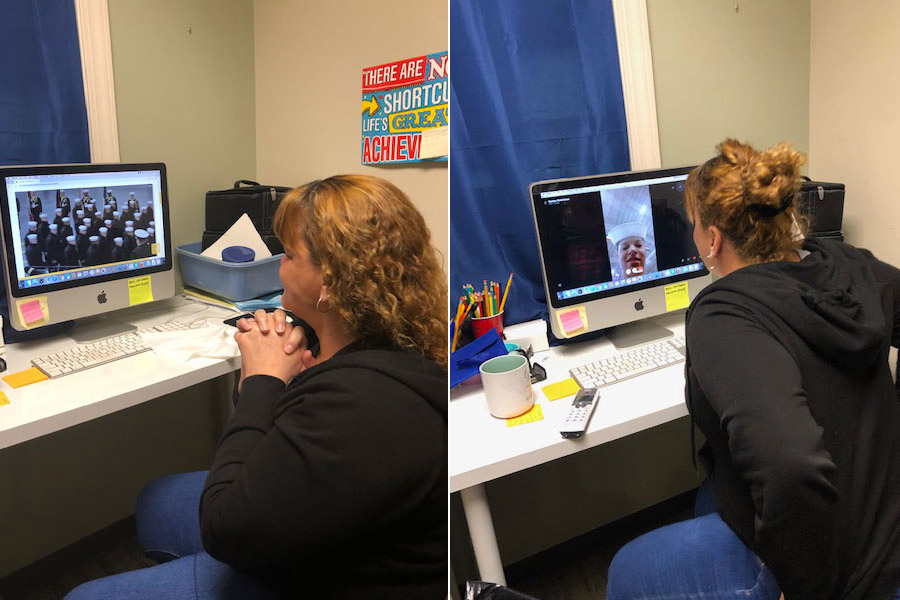
March
Patrice Funderburg visits The Francene Marie Show to talk about her new role as executive director and the future of CCT.
April
The United Way of Central Carolinas and the COVID-19 Relief Fund award CCT a $50,000 grant to support clients and operations during the pandemic.
May
LifeWorks! launches an e-learning platform to serve clients virtually and engage with them through technology. The pilot program kicks off with an employment readiness workshop.
Families Doing Time shifts Third Tuesday family gatherings to an Every Tuesday meal distribution program to assist families during the pandemic. Families pick up essential supplies and groceries, including nonperishables, children’s books and games, toiletries and cleaning supplies.
June
Board Chair Marc Jarmosevich discusses the Black Lives Matter movement and how “our clients are disproportionately persons of color because of the rules, policies and traditions in place.” He notes his commitment “to working with our partners across nonprofits, government agencies, and the corporate and small business community to break up those norms.”
